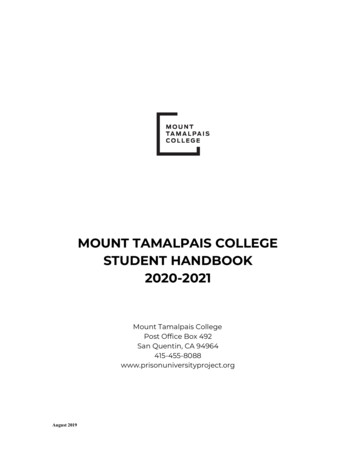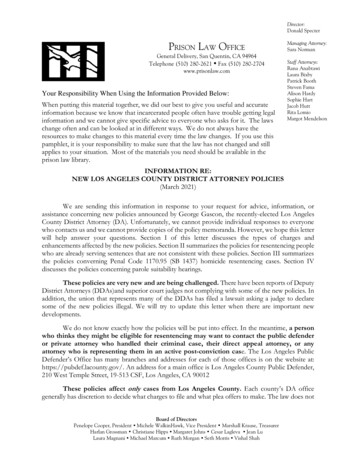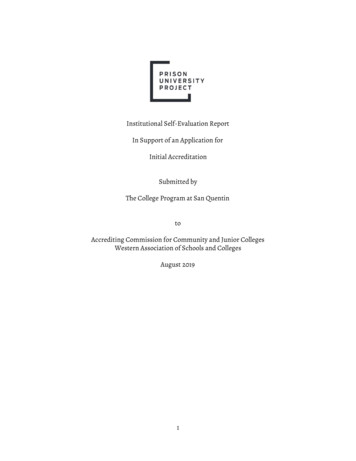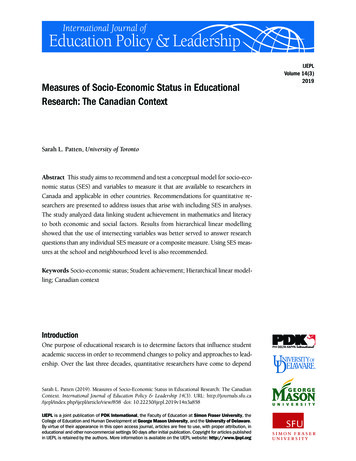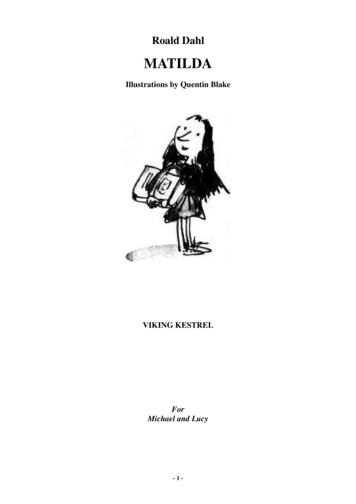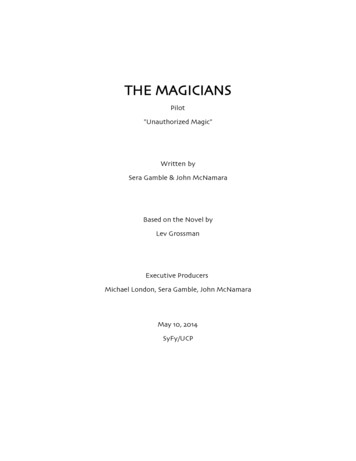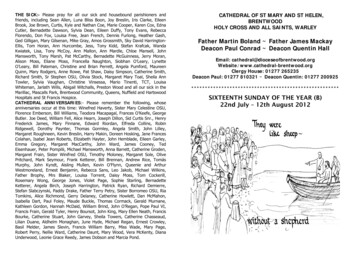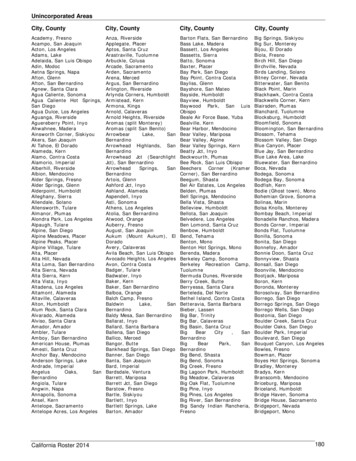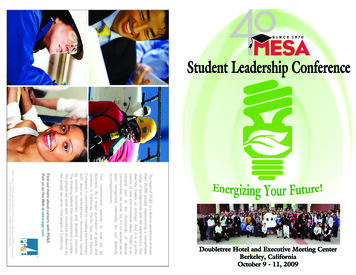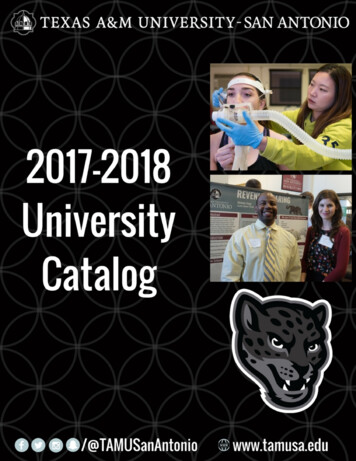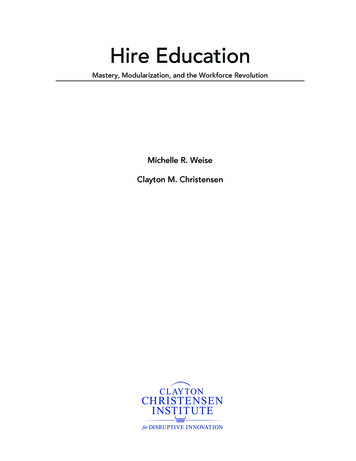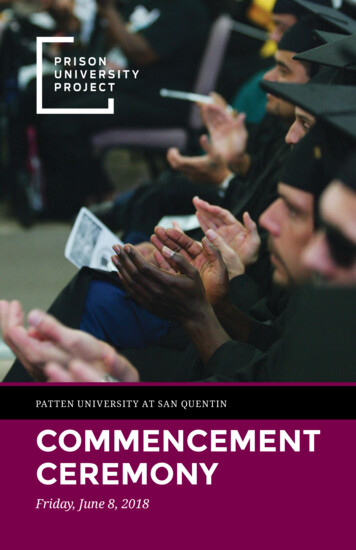
Transcription
PAT TEN U NI V ERSIT Y AT SA N QU EN TINCOMMENCEMENTCEREMONYFriday, June 8, 2018
ACKNOWLEDGMENTSWe would like to extend our sincere thanks to the San Quentin administration. Inparticular, we’d like to thank Captain Ray Escalera, Lieutenant Sam Robinson, andLieutenant Donald Spurgeon, for their support over the past year. Thanks also toWarden Ron Davis.For his support with the commencement ceremony, clearances, and the operationof the program, we would like to extend our thanks to Steve Emrick. Many thanksas well to Raphaele Casale, Shannen Wright, and Christina Sanchez for theirongoing assistance.For their efforts to keep classes running smoothly and all of their support inEducation, we would like to thank Officer Sanford, Officer Reyes, Officer Barr, andOfficer Steward, as well as the other custody staff who enable this program to runinside San Quentin’s walls. Our gratitude also goes out to Officer Dolan, OfficerTristant, Officer Bock, and Officer Yatabe for their outstanding help in bringing ourvolunteers into San Quentin efficiently.We also want to express our gratitude to the folks in the warehouse. In particular,we’d like to recognize Bob Cutting, who does a great job to ensure that we receive allthe materials we need in order to run classes.Additional thanks to Steve Pascascio for sound engineering and technical assistance. Thanks to Dwight Krizman and Lee Jaspar for organizing and performing thismorning.Finally, we give tremendous thanks to our volunteers and donors, without whomthere would be no College Program at San Quentin.With gratitude,The Prison University ProjectFollowing are excerpts from a series of interviews with the graduatesregarding their experiences in the College Program.
PROGRAMProcession of GraduatesWelcomeJames King, College Program ClerkKeynote SpeechJason Bell, Director of Project Rebound ExpandedSalutatorian SpeechJose RiveraPerformanceSan Quentin BlueRichie Morris, Dwight Krizman, and Charlie SpencerConferring of DegreesThomas Stewart, Ph.D., President, Patten UniversityAaron Hiatt, Registrar, Patten UniversityJody Lewen, Ph.D., Executive Director, Prison University ProjectAmy Jamgochian, Ph.D., Academic Program Director,Prison University ProjectClosing RemarksJody Lewen, PhD., Executive Director, Prison University ProjectRecession of GraduatesTHE CLASS OF 2018Jens BrazwellHarry HemphillClaudius JohnsonCraig JohnsonNathan MckinneyGerald MorganJose Rivera,SalutatorianDarin WilliamsJeffrey Williams,Valedictorian
HARRY HEMPHILLThis foundation is what’s going to carry me through to a successful life.I came to prison with a 15-year sentence.The first few years of my incarceration I was at a different prison wherethere were no higher ed opportunitiesand I found my brain going to mush.Attending Patten University helped mereconnect with myself. I rememberedthat I am more than just an incarceratedman — I started believing in myself onceagain. This foundation is what’s goingto carry me through to a successful life:a healthy family environment and theability to give back to my community.—I’d like to think that after every class I left a positive impression on everyone andhelped create a healthy environment for learning. It was never just about my education, but also about how I could help others become the best they could be. I’d like tothink I’m an example of what a diligent student looks like.—The lack of education is what sends people on a destructive path. To incoming students, I tell them to take advantage of this opportunity and really apply themselvesand get all they can get out of the education — each and every class. Rise above justgetting by and really apply yourself. The experience ingrains new habits you mightfind helpful in other areas of your life. Let this be a beginning.
CLAUDIUS JOHNSONEven though I’m incarcerated, I feel free.What I remember most about theimpact of attending college wasreading Descartes’ Meditations onFirst Philosophy. At the time I was in astruggle with my warped belief system.Item by item, Descartes realized hisbeliefs were all wrong. As I created mypresentation for the class, I began tochallenge things that I thought I knewand I scratched them off the list. I askedmyself, “Is this working for me?” It wasan “aha moment” — a chance to changemy ideology. I saw that my conditioninghad led me to believe certain things,for example, that violence was the key to everything, and that my behaviors werelearned. After the reading, I started attending self-help groups. These days I still wantvalidation and acceptance, but now I’m being validated for other things. Like fornever giving up. I have a support system of teachers and other students and I knowI’m not alone. I’m nothing like the person I used to be. The reading changed my lifeand showed me that change was possible.—Most people think people who are incarcerated are ignorant, hardened criminalswith no feelings. I see that incarcerated people are people who are unfortunate inthe area of pro-social skills. Our parents didn’t have the best knowledge or educationand they did the best they could. This could happen to anyone. And it has happenedto everyone. When you know better, you do better. That’s why education is the keyto freedom. I don’t have the chains of ignorance or violence anymore — even thoughI’m incarcerated, I feel free.
DARIN WILLIAMSOur pre-incarcerated educational experiences are diverse.The differences between correspondence classes and this educationalexperience are immeasurable. I’m lightyears ahead now. The Prison UniversityProject’s college prep classes gave me astrong foundation and taught me to vieweverything through a different lens. Thisfoundation shows up in my everydaylife. In magazine articles, papers I read,essays, in conversations, in politics. NowI can join in on the conversation becauseI have an idea about where peopleare coming from. When I’m reading anewspaper article, I can see how smallerperspectives funnel into larger ones. I can see subtle dynamics playing out in theargumentation in the article. I see the mechanics of writing in a way I hadn’t previously understood. I have a new tool set and a new lens through which to view thiskind of dialogue.—I understand this after being in here for quite a while: our pre-incarcerated educational experiences are diverse. Some of us had little or no positive relationshipwith the education system. I was in the gifted program and an avid reader, but bythe time I got to junior high I was veering off the path. The College Program encourages people with negative educational experiences, and gives them the ability topersevere, ask for help, and be vulnerable. The Prison University Project staff andinstructors have all been cheerleaders for me. With the wide variety of individualsthat come in here there’s always someone that will teach to you in a way that youcan understand. The students in this program grapple with each other to understandand see things in new ways. Every time I break through and understand somethingchallenging I get a sense of accomplishment.
CRAIG JOHNSONI will always try to help my fellow veterans however I can.Ever since I served in the Navy I’ve beenfascinated with the stars and the planets.So when the opportunity presenteditself, I signed up for the astronomyclass. I learned many things — what anastronomical unit was, the differencesbetween the various types of stars, whatdark matter is, and the plane on whichthe planets orbit the Sun. The best partof the class was on the last night, theinstructors were allowed to bring in acouple of telescopes, and because of thelack of bright lights, we were able toview the planets — Mars, Jupiter, Saturn,and their moons. We also gazed at the star Betelgeuse, a red supergiant variable starin the Orion constellation. I remembered the times I was out at sea, where on a clearnight, the belts of the Milky Way were a sight to see.—I served in the US Navy from 1973 to 1979, which included the final days of theVietnam War (the evacuation of Saigon and the Mayaguez rescue). When I returnedto the “world” (the US from overseas) I really wasn’t welcomed like those who servedbefore me. For many years after being incarcerated for my crime I had no sense ofpurpose. But in the late 80s, this changed when veterans groups were allowed to beformed within prisons. I’ve been involved ever since. For the most part, incarceratedveterans are forgotten — out of sight, out of mind. For those of us who served ourcountry in the military in one form or another, we deserve to be recognized for thatservice. So today I feel good when men in here thank me for my service, and I willalways try to help my fellow veterans however I can.
NATHAN MCKINNEYI dreamed of graduating from an institution of higher learning. s I prepare for graduation, I want toAdepart with a legacy of determinationand perseverance. I want this legacy totouch not only the people inside of SanQuentin, but to resonate with the community beyond this institution. Manytimes while growing up, I dreamed ofgraduating from an institution of higherlearning. A higher degree was my ideaof a stepping-stone to greater economicand social status, while experiencing thestrong character development associatedwith collegiate camaraderie. Throughthe Prison University Project, mymission has been fulfilled.—Education gives you a chance to demystify your life experiences, to articulate thingsthat have happened to you, and to understand how your socialized beliefs are notreally beliefs; they’re just what you learned. Understanding socialization has greatlyimpacted my growth, and led to rapid maturation. I have resolved an identity crisis,and developed a fluid understanding of relationships with friends, family, and adversaries. I have better and elevated tolerance.The self-realization and reflection was like a snowball rolling down a snow-coveredhill — it wasn’t a sudden revelation, it was subtle, a process. It all galvanized. When Irealized I had arrived someplace new, it was an “aha moment” on a neurological andspiritual level.
JOSE RIVERAI was able to rediscover the person I was before.Being part of the Prison UniversityProject has given me purpose.Throughout my incarceration, I had littleto stimulate me mentally, or to make mefeel as if I were doing something worthwhile. One of my sisters is a teacher andnow our conversations have more substance and are at an adult level. Before,we could only talk about memories, andnow we can discuss subjects like philosophy or the methods of learning thatwork best. I believe these connectionshave brought us closer as siblings.—The College Program gave me something to look forward to and has not only givenme an education, but it has also made me remember that I wasn’t always a prisoner.Through my classes and interaction with teachers and tutors, I was able to rediscover the person I was before I learned the prison rules. Attending the college gave memore than a degree, it showed me life outside of these walls.—I want people to understand that, although I committed a crime, I have looked at mylife and my choices and have made a sincere effort to better myself. I didn’t haveto; I was serving a sentence with no real chance at parole. But I owed it not only tomyself, but also to my loved ones, and I realized I owed it to my victim. There is a lotof self-evaluation in prison and, more times than not, a better person leaves than theone who entered.—My fellow graduates, “We did it!” We persevered through lockdowns, crazy schedules, cellie drama, and yard nonsense and we met our goals. But, this can’t be theend. If this journey has shown me anything it is that education never stops. I intendto keep learning for the rest of my life. We have reached the last rung on this ladderbut it is only one level. The sky is vast and our untapped potential has no bounds.When, not if, we go home we have to be the example to those we want to save fromhaving to learn their lessons the hard way, the way we did. Our lives mean something. We have not allowed our minds to be idle; we have exercised our brains andnow, our brains demand more. Let’s give it to them.
GERALD MORGANToday I am identified as father and grandfather.Prior to being institutionalized, I felt thatprison would be the last place to find one’sblessings. However, the Prison UniversityProject has been just that, a blessing. Thestaff opened students’ eyes, and my ownto my many flaws. In my case, my flawedparenting skills. Child Psychology changedmy eternal connection to my children; itgave me tools to see deep-rooted culturalproblems that have existed through generations of my family tree, to see where Ifell off the tracks with my children. Moreimportantly, it showed me how to get backon track. This course was like defrostingan iceberg. I realized I had been practicing the same ideology on my kids that my fatherhad practiced on me. I wrote letters to all of my children. There was a time that my children did not know how to feel about me. Now, they aren’t scared of me like I was of myfather. Today I am identified as father and grandfather. The healing started with threewords, I love you, words that I never was able to use comfortably before.—I have found that individuals, like myself, are caught up in the system, simply by beingsubmerged in a culture within a culture, in communities that have a different codeof survival. Most never have contact with the criminal justice system until they arecaught in its web. Today I have a better understanding. I know and I try to explain theblack hole of incarceration. I want people to understand that without an education andwithout understanding the rules of the land, the justice system will continue to removefuture leaders, fathers, family, and friends from their needed positions in society.—I have always admired the instructors’ and tutors’ involvement with each student.Each has been influential in my higher education. I could start with Aaqilah whotaught Child Development, which changed my relationship with my children. Therewere tutors who battled with my limited abilities to retain formulas to solve algebraproblems. Tutors like Harriet who smiled year after year, overlooking my shortcomings. And Michael, who would ride his motorcycle through the rain on weekdayevenings to tutor me. I can’t possibly list anyone in the College Program staff withoutgiving credit to all. But it would have come to an abrupt end last semester if Neil andAmy hadn’t noticed that I reached a point of struggle where I had planned on givingup. This is why I say no individual was more influential than another; being that allthe staff has one agenda, to educate all to the best of their abilities.
JENS BRAZWELLDon’t forget to be good to others, even when it pains you.Many of the same people who havehelped me to my success could also beblamed for my many failures. There are,however, a few who have had nothingbut positive influence on my life. Here’sa very, very short list: r. Gordon Marshall, my very firstDcollege professor, and former stateemployee. A Doctor of Psychology whodisagreed with the State of California’simplementation of his chosen profession, yet, still found a way to bring us hishealing personality, without it being a“treatment modality.”Bret Turner, Vincent Baum, and John Baum, people whom I’ve met on this prisonterm. People who don’t pass judgment on me. People who have given me faith inpeople once more.Kristy Lee Zipper. We met at a bar on her 21st birthday. She is from Florida, had traveled all the way to California to celebrate her special day with friends, and woundup spending most of her three-day weekend with me. It is the only “successful” loverelationship I’ve ever had.To my newest friend, the Reverend Judith Ann Glasse. She shines her light into theblack corners of my darkness.—Don’t be in a hurry to have all the material things in this life. Be happy and contentwith what you have. Know that when you earn something, through your own hardwork and effort, it will be more valuable than something given to you, or stolen.Intentionally hurting others is the continuation of the cycle in which you have beentrapped, but you can spring yourself from the trap by being kind. Stay young atheart, be alive, go out of the house every day, dance, sing, enjoy your youth, love whoyou want to love and hope that they love you back.Don’t forget to be good to others, even when it pains you. No good can come ofviolence; take your aggression out in a positive way whenever possible. Stay humble,and do what feels good and bring honor to your family and yourself.
The mission of the Prison University Project isto provide excellent higher education to peopleat San Quentin State Prison, to support increasedaccess to higher education for incarcerated people,and to stimulate public awareness about highereducation access and criminal justice.
Attending Patten University helped me reconnect with myself. I remembered that I am more than just an incarcerated man — I started believing in myself once again. This foundation is what's going to carry me through to a successful life: a healthy family environment and the ability to give back to my community. —
